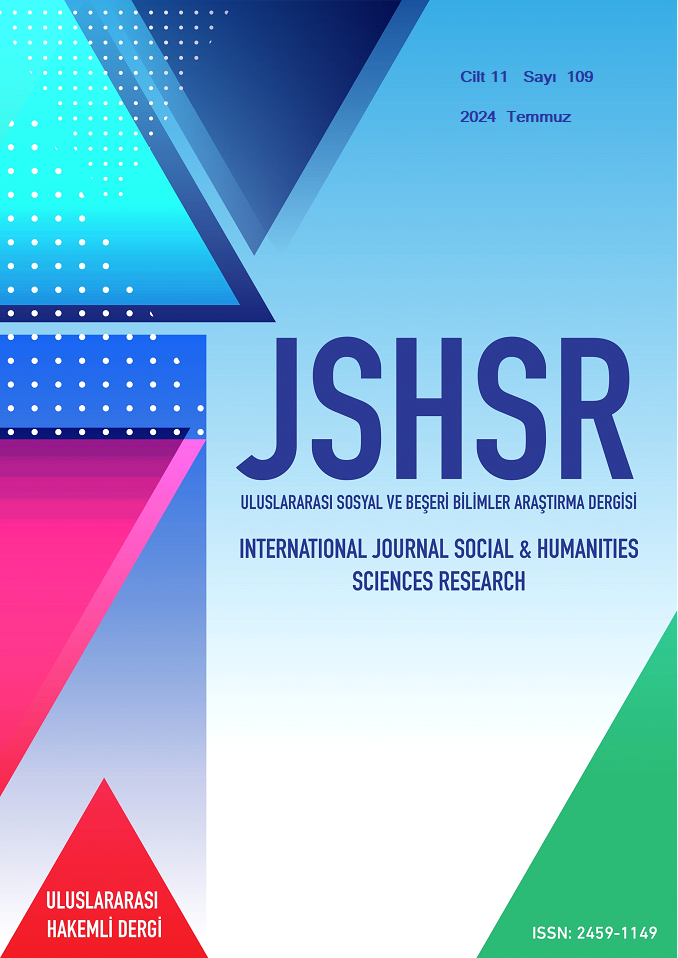An Eco-Dystopian Novel within the Framework of Turkish Language and Literature Education: Children of the Last Island
DOI:
https://doi.org/10.5281/zenodo.13147059Keywords:
Dystopia, Children of the Last IslandAbstract
Dystopia has been a concept frequently heard about global issues such as wars, economic depressions and climate crisis since the beginning of the 20th century. Dystopia has become increasingly popular as a genre in literature and art. Eco-dystopia, which can be considered as a sub-branch of dystopia, deals with environmental disasters that will occur due to the disruption of ecological balance. The number of novels written in the eco-dystopia genre has started to increase recently due to problems such as the oil crisis and climate disasters caused by global warming. Especially young people's interest in novels written in this genre is increasing day by day. Dystopian novels also contain didactic elements. For this reason, it is possible to catch many points that inform and enlighten the reader about environmental awareness in novels written in the eco-dystopia genre. There are eco-dystopian novels that will enable young readers, in particular, to have a more questioning perspective on environmental awareness. For this reason, the use of eco-dystopian novels as an auxiliary resource in education will contribute to the reader in environmental awareness. In this study, we tried to focus on the usability of Zülfü Livaneli's work, Children of the Last Island, an eco-dystopian novel, as a teaching material in secondary school Turkish language and literature courses.
References
Ağkaya, O. (2016), Ütopya ve distopya: siyasetin edebiyat üzerindeki etkisi, Manisa Celal Bayar Üniversitesi Sosyal Bilimler Dergisi, 14(4). 23-48. https://doi.org/10.18026/cbayarsos.280053.
Akkoyun, T., (2016). Ütopya/distopya: Batı ve Türk romanlarından örneklerle bir karşılaştırmalı edebiyat çalışması. Kurgu Kültür Merkezi Yayınları.
Atasoy, E., (2017). Ütopyacılık, ütopya ve distopya üzerine genel ve eleştirel bir bakış. Doğu Batı Dergisi, 80, 55-71.
Basu B., Broad K.R. ve Hintz, C., (2013). Contemporary dystopian fiction for young adults: Brave new teenagers, Routledge. https://doi.org/10.4324/9780203084939
Bezel, N. (1984). Yeryüzü cennetleri kurmak. Say Yayınları.
Blasingame, N. ve Nilsen, D., (2014). Literature for today's young adults. Pearson Booker.
Booker, M.K. (2012). Ütopya, distopya, toplumsal eleştiri. (Çev. Oğuz Tecimen). Notos Dergisi, 36, 44-46.
Claeys, G. (2011). The origins of dystopia: Wells, Huxley and Orwell. Gregory Claeys (Ed.). Utopian literature içinde. (s.107-131). Cambridge University Press.
Çakmak S., (2016). 1980 sonrası Türk edebiyatında karşı-ütopya. [Yayımlanmamış yüksek lisans tezi]. SB Enstitüsü, Hacettepe Üniversitesi.
Durmaz Aksu, E., (2019). Hukuka güvenebilir miyiz? Ekolojik distopyalar ve gerçek felaketler. Hukuk Kuramı. 6(2), 1-22.
Emre, İ., (2022). Topya, ütopya, distopya. Gürhan Çopur. (Ed.). Edebiyatta ütopya distopya içinde. (s.20-29). Ihlamur Yayıncılık.
Filazi G., Çuhadar S., Karaca D., Bozbıyık N., Baycanlar M. (2023). Ortaöğretim Türk Dili ve Edebiyatı 10.sınıf ders kitabı. MEB Yayınları.
Garrard, G., (2017). Ekoeleştiri: Ekoloji ve çevre üzerine kültürel tartışmalar. (çev. Ertuğrul Genç). Kolektif Yayınları.
Kumar, K., (2016). Modern zamanlarda ütopya ve karşı ütopya. (çev. Ali Galip). Kalkedon Yayınlar.
Livaneli, Ö. Z. (2020). Son Ada’nın çocukları. Doğan ve Egmont Yayıncılık.
MEB Talim ve Terbiye Kurulu Başkanlığı (2018). Ortaöğretim Türk Dili ve Edebiyatı Dersi 9,10,11,12. Sınıflar Öğretim Programı. Ankara.
Sertbarut M. (2018, Nisan 19). İş kitaba gelince herkes gardiyan, herkes RTÜK’çü, herkes pedagog, https://www.edebiyathaber.net/miyase-sertbarut-is-kitaba-gelince-herkes-gardiyan-herkes-rtukcu-herkes-pedagog/.
Stableford, B. (2017). Ekoloji ve distopya. Zeynep Demirsü (Çev.). Ütopya edebiyatı içinde (s.359-390). İş Kültür Yayınları.
Şen E., (2022, Mayıs 16-18). Çocuk ve gençlik edebiyatında distopya ve pedagojik boyutu (“Adı sıfır)” adlı eserin incelenmesi). Uluslararası Çocuk Sempozyumu. Sinop, Türkiye.
Yumuşak, F. C., (2010). Bir kehanet olarak karşı-ütopyalar. Hece. 160, 77-86.
Yücel, İ., Türkyılmaz, M. & Sağır, S. (2023). Ortaöğretim Türk Dili ve Edebiyatı 11.sınıf ders kitabı. MEB Yayınları.
Downloads
Published
How to Cite
Issue
Section
License
Copyright (c) 2024 INTERNATIONAL JOURNAL OF SOCIAL HUMANITIES SCIENCES RESEARCH

This work is licensed under a Creative Commons Attribution 4.0 International License.


